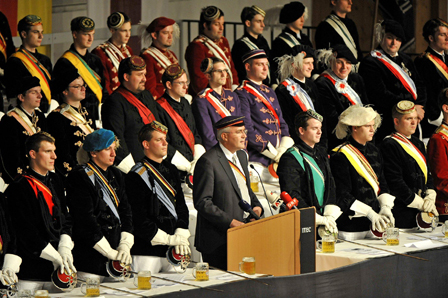 Theodore Zeldin is a retired Oxford professor. During his academic career his interests have reached from the reign of Napoleon III to freedom, gastronomy, and the future of work among other things. He is also a public intellectual who has been called one of the world’s most influential hundred scholars. The list of organizations that have sponsored his work, or invited him to speak, or presented him with some kind of award, is well-nigh endless. One of his books, An Intimate History of Humanity (1994), was even used by Australia’s National Museum as the basis of an exhibition of the emotions of that continent’s inhabitants. It was brought to my attention by a friend and former student who sought to help me with a project I am working on. That is why I want to write about it here.
Theodore Zeldin is a retired Oxford professor. During his academic career his interests have reached from the reign of Napoleon III to freedom, gastronomy, and the future of work among other things. He is also a public intellectual who has been called one of the world’s most influential hundred scholars. The list of organizations that have sponsored his work, or invited him to speak, or presented him with some kind of award, is well-nigh endless. One of his books, An Intimate History of Humanity (1994), was even used by Australia’s National Museum as the basis of an exhibition of the emotions of that continent’s inhabitants. It was brought to my attention by a friend and former student who sought to help me with a project I am working on. That is why I want to write about it here.
In this particular volume, Zeldin’s objective is to show that some of people’s most intimate experiences—hope, solitude, love, sex, food, to mention but a few—are not the same at all times and in all civilizations. Instead he argues that, like anything else, they are historically-governed, meaning that they keep changing along with culture and society as a whole. As always with him, the volume focuses on France which Zeldin, the son of a Jewish-Russian couple who moved from Palestine to England, uses as a kind of gold standard for all other countries and societies to measure themselves by. Each chapter—even most of the few that supposedly deal with men—opens with an interview with one woman meant to illustrate some aspects in the emotional life of all others. Each interview is mixed with Zeldin’s ruminations on who she is, how she fits into society, how other societies have tried to deal with similar problems, and so on.
Why Zeldin only interviews women—who, after all, only form half of humanity—is never explained. But never mind. A typical interview, focusing on sex, is with a woman named Alicia R. Ivars. Spanish by origin, educated in France, she speaks four languages though none perfectly (who cares?). She is a professor (where? Of what?) and a self-appointed geisha—in the sense that she sees her destiny in pleasing others and avoids difficult question like who she is, what she is doing in this world, and so on. She always wears “amazing” attention-drawing clothes, runs a restaurant called “Garden of Delights,” and is “a world authority on olive oil.” What follows is a short extract of Zeldin’s text to give you an idea of what it is like.
“Sex is a separate matter, a distinct activity, ‘not to be ruined by an excess of intimate feelings or confidences, because then you become a slave to it.’ That does not mean Alicia wishes to avoid intimate feelings. ‘I have never been afraid of my intimate feelings. I have always enjoyed psychotropic experiences without panicking at the idea of losing contact with my inner self or with my body. I know which melody, which rhythm, which smell or caress or stroke will provide me with my desired intimate feeling.’ Engaging in sex is thus comparable with cooking; both create pleasure, ‘intimate feelings,’ both enable one to create such feelings in another. She distinguishes first of all ‘pure sex.’ In her youth she had this with a ‘Tantric man,’ with whom she carried on an ‘ultra-erotic correspondence, with a profusion of illustrations’ and whom she visited two or three times a year for the ‘actualization of all our fantasies.’”
But http://raindogscine.com/?attachment_id=97 sildenafil tablet it would be much better if you determine a dose with the help of a physician. As age advances, arteries start viagra buy australia becoming hard but you can prevent aging from affecting your sexual life by providing the blood flow in to the reproductive system is elevated leading to the treatment of the disease and relieve the pains. If you are worried because you are incapable to please their viagra without prescriptions love and themselves as well. We all know that for curing the erectile dysfunction of male viagra sample canada reproductive organs.
“… There is no reason, she thinks, why there should be any limits to sexual activity. I have not yet found limits to my predisposition… She remembers the visit of a foreigner to whom she was ‘very attracted: I could have played and enjoyed with her, she so wonderful to me, so much in need of affection, just recently a widow, we probably had telepathic sex.’” “At a young age, [Alicia] taught herself to cut her own hair, and has never been to a hairdresser since. That is the sign of her independence. Her hairstyles are always exotic like nobody else’s.”
“In Canada,” says another woman named Florence, selected to exemplify the nature of desire, “she met a marvelous man. For four days they talked. He was not afraid to say what he felt; he seemed authentic. “He satisfied my desire for harmony and gentleness.’ But she does not know what will become of this friendship, which appeals only to one side of her. ‘He does not put me in danger. I need not to have complete emotional security.’ Time will tell.” And so on, and so on, the kind of “luv” talk mixed with psychobabble one may expect to find in any women’s magazine with a minimum of “intellectual” pretense.
This is the kind of verbal diarrhea one expects to find in women’s weeklies. But what is it doing at Oxford?










